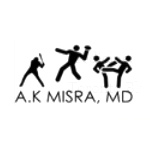Health Tips brought to you by U.S. HealthWorks Medical Group. Our experienced medical experts provide information here that we hope will broaden your health care knowledge.
In light of back-to-school season, we talk to Dr. Anuruddh Misra about the importance of sports physicals for young students, collegiate and even professional athletes. Dr. Misra is a medical director with U.S. HealthWorks in South San Francisco and is double Board Certified in Sports Medicine and Internal Medicine.
Q: What is a sports physical and why is it important?
A: A pre-participation physical (PPE), or sports physical, is an examination typically done by a sports medicine physician to assess an athlete’s readiness for participation in a specific sport. It is estimated there are no less than 10 million of these done annually for adolescents as well as collegiate and professional athletes. Currently, 35 states in the U.S. require an annual exam for high school sports participation.
The importance is to screen for all germane medical issues (e.g. cardiac, neurological, pulmonary), which can complicate and potentially even threaten the life of an athlete planning to participate in a sport or event. For example, the relative risk for SCD (sudden cardiac death) is 2.5 times greater in athletes versus the general population, so it’s essential to make sure an athlete is in good physical condition before playing sports.
Q: What are the goals of a sports physical?
A: Apart from those mentioned above, other goals include determining the overall health of the athlete, assessing fitness in general and for sport-specific activity, to counsel and educate on lifestyle choices and high risk behaviors, ensure vaccinations are up-to-date and address concerns or questions the athlete may have. I like to direct all my patients (athletes or otherwise) to this terrific website, an outstanding resource to learn more about how pivotal exercise is to their wellness and health outcomes.
There are numerous medical conditions, ranging from dermatological to psychiatric, that need to be considered in fitness for sports. There are also several special circumstances to consider-including sickle cell disease and trait; concussions and post-concussion syndrome; athletes with a current history of cancer or athletes with a history of transplanted organs. Other conditions include eating disorders, bleeding disorders, the disabled athlete, the pregnant athlete, the presence of an enlarged spleen, and possibly others.
Q: How are sports medicine physicals generally conducted?
A: Most are done in a private office, however they can also be done in mass examination format where the athlete goes from station to station (general medical exam to Orthopedics to Cardiology etc.). They are typically done approximately six weeks prior to the start of play to address any issues requiring attention discovered in the evaluation. Lab work is not generally required for sports medicine physicals.
Q: There has been some controversy recently as it relates to the sports physical. Can you comment about this?
A: Yes - while I would not consider it a true controversy, there has been considerable debate about the cost-effectiveness of the sports medicine physical, its inherent limitations and the relative lack of scientific evidence as it relates to being a reliable screening tool.
Another area of debate at our annual scientific sports medicine meetings has been whether or not a screening EKG (a test that checks for problems with the electrical activity of your heart) should be done to screen for cardiac abnormalities that can pose a lethal threat to athletes, such as hypertrophic cardiomyopathy – which is a primary disease of the heart muscle called the myocardium. This has been recommended by the European Society for Cardiology for many years.
This debate and discussion has been advanced through the efforts led by my colleague at the University of Washington (Dr. Jonathan Drezner) and his associates who founded what is known as The Seattle Criteria to define standards for EKG interpretation in athletes. The result was the development of a comprehensive training resource to help physicians distinguish normal EKG alterations in athletes from abnormal EKG findings associated with SCD.
An exciting development on this front is both Dr. Drezner and another colleague of mine – Dr. Francis O’Conner, who is in the Uniformed Services University of Health Sciences in Bethesda, Maryland – are moving forward with a collaborative effort to screen military recruits with EKGs to determine if doing so would prevent otherwise avoidable adverse cardiac outcomes. I, along with my sports medicine and cardiology colleagues, eagerly await to review their results once available.








